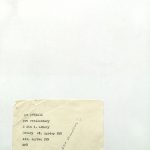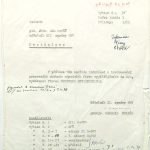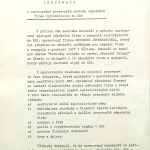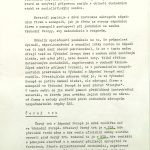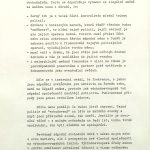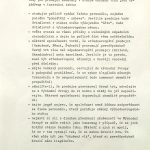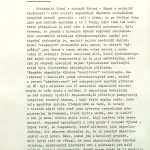Instructions for Businessmen
Instructions for West European Businessmen Working in the East
When cataloguing archival funds and collections, the archivist is often in doubt, and asks: Where should this document be placed? What to do with it? And it sometimes even happens that similar doubts are discovered even on the part of those for whom the document was intended. A telling comment by a certain official, What should I do with this?, also introduces a very interesting material created in July 1978, now part of the Economic Counterintelligence Headquarters collection (codename Department XI), currently being catalogued at the 2nd department of the Security Services Archive. While the archivists in charge are preparing an exact description of this material which isn’t easy to catalogue, and before they determine its storage unit, we decided to present it also herein.
The document contains information pertaining to the instructions given to associates in western companies doing business trips in socialist countries. The instructions were prepared by Business International on the grounds of intelligence supplied by special services, especially from the USA, West Germany and Great Britain. The material was presented at a seminar held for western companies and monopolies in December 1977, and was designed for representatives of western companies to inform them how cautious they should be in dealings with Eastern European countries. Who gained the instructions for the Czechoslovak security services is not known; the analysis of the document was completed by them in July 1978.
As a great threat to successfully concluding a transaction, the document obviously mentioned alcohol and women. The dealers were advised to beware especially of an unintended leak of information. The recommendation was: “Never hire an ardent anti-communist for Eastern European countries, as when alcohol helps him speak, he could become unpopular with his hosts, and so permanently ruin your company’s business relations in Eastern Europe.” When concluding contracts, it was appropriate to adopt oneself to the local habits, including consumption of alcohol, but that should not be done when not necessary. West European experts were aware of the fact that the northern countries where vodka was a usual drink were more challenging, while the situation in southern countries where wine was preferred was easier to handle. The nicest bars and seductive women were reported to be available in Warsaw and Budapest, while less attractions were found in Moscow and Sofia where the girls allegedly failed to meet western standards. What was the standing of Prague in this respect unfortunately isn’t mentioned in the document.
Ordinary habits when concluding contracts included giving gifts to business partners. The document, however, gave a strong warning that such practices could easily lead to one ending up in prison, suspected of bribing: “Gifts help to develop further good personal relationships in Eastern Europe; it is, however, very difficult to determine the border between ‘sales support’ and bribery.” Moreover, the situation was different in every country: “The Poles could accept a box of Scotch whiskey from a western company, while in East Germany and Soviet Union this could be seen as attempted bribery with unpleasant consequences.”
The businessmen were advised to avoid, in Eastern European countries, any unnecessary contact with the local police. The west European experts emphasised that “road accidents are by far the most common cause of legal issues of western businessmen in Eastern Europe. Poor roads, bad lighting and exotic traffic (i.e. horse carts with no lights), the headstrong donkeys and sheep, vagrant drunkards and undisciplined drivers make road transport in Eastern Europe much more hazardous than it is in the West.”
There is also a separate chapter on the hazards of the black market, which, according to the experts, was widespread in Eastern Europe, especially in Poland and Hungary. The businessmen were to be cautious especially as regards eavesdropping and phone tapping in the hotels, and also the fact that in Hungary, for instance, taxi drivers or chambermaids were quite reluctant to accept tips in the local currency. But hotels were very often a direct source of information for the local secret police which controlled a major part of the black market. “… even the quickest exchange transaction around the corner in a street is probably monitored and the other party is then interrogated and documented as a potential witness.” The instructions warned that everyone could be detained and interrogated or imprisoned, and stated directly that “if you find out that your dealer operated on the black market, withdraw the dealer from Eastern Europe within 24 hours and never use him again. Some companies recommend immediate notice.”
ABS, Economic Counterintelligence Headquarters (Department XI) collection, Box 47, Information on instructions for associates of western companies doing business dealings in socialist countries.



